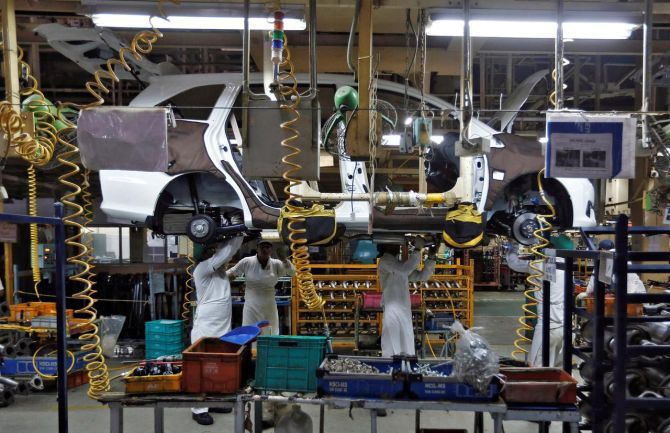The region is India’s largest auto hub and the slowdown in the sector has hit it hard.
As car sales plummeted by over 20 per cent year-on-year, production cuts by auto majors have led to thousands of contractual workers being laid off.
Arnab Dutta reports.

Part I: As slowdown gets worse, Pimpri-Chinchwad auto hub is in slow lane
Part II: Motown crisis: Contract workers are the worst hit
About 2 kms from the Industrial Model Township (IMT) at Manesar on National Highway 48, a group of workers, labour union leaders and activists have gathered to protest against the retrenchment of contractual workers in the auto firms in the Manesar-Gurugram belt.
It is 4 pm and their agitation picks up as a new group of leaders from CITU joins in, their voices rising alongside the blare of continuous announcements from the loudspeaker.
Satbir Singh, general secretary of CITU’s Haryana unit, sounds sombre when he speaks to this correspondent after delivering his speech.
Singh has been attending similar gatherings in Haryana’s industrial belt for the past few months.
The region is India’s largest auto hub and the slowdown in the sector has hit it hard.
As car sales plummeted by over 20 per cent year-on-year, production cuts by auto majors Maruti Suzuki (MSIL), Honda Motorcycle & Scooters (HMSI) and Hero MotoCorp have led to thousands of contractual workers being laid off.
CITU estimates that the contracts of at least 40,000 such workers have not been renewed in the last few months.
Other labour activists say the number is higher - as much as 50,000 - which includes job losses in over a dozen factories that have shut shop in the past one year.
As demand for car dwindled, some 15-16 ancillary plants, including Omax’s plant at IMT Manesar and in Dharuhera, the Automax plant at Binola and Speedomax plant in Sidhrawali, have suspended operations and retrenched thousands of non-permanent workers.
The region houses as many as seven major auto plants.
While MSIL has three, Hero MotoCorp, the country’s largest two-wheeler maker, has two.
Suzuki Motorcycle India and HMSI have one each.
And about 1,500 small and medium units are dependent on these auto majors.
They, along with the large plants, used to employ over 200,000 contractual workers when times were good.
MSIL, the country’s largest auto maker with close to 50 per cent share in the passenger vehicle market, has been among the worst hit by the slowdown.
According to Rajesh Kumar, president of the labour union at MSIL’s Gurugram plant which makes the top-selling Swift and Alto cars, it has reduced production by 30-35 per cent.
“Production cut was inevitable due to poor demand.
"The slowdown is real. While no permanent workers have been sacked, thousands of casual workers, interns and contractual workers have been laid off,” says Kumar.
Of the three MSIL plants in the area, it is the Gurugram plant that has been affected the most.
Kumar says that whereas earlier, some 10,000 non-permanent workers were employed in these three units, the number has come down to about 6,000.
Production at Manesar Powertrain, an MSIL plant that makes all the engines and transmission parts, is also down by 20-25 per cent.
But the number of retrenchment is less here, says Subhash Pradhan, a senior worker at the plant.
“If the entire industry is suffering from a slowdown, then no one will be spared. But we are still running all the three shifts,” he says.
That’s not the case with the small and medium units. With auto majors cutting back on their orders, many of them, such as Rico Casting and Shivam Autotech, have also been forced to cut production and reduce the number of their shifts.
Component maker Bellsonica, one of the 350 ancillary units that supplies directly to MSIL, is running only two shifts now.
It also laid off nearly 400 non-permanent workers earlier this year.
And given the situation, workers can’t even hope for a revision in their wages.
“How do we survive with Rs 8,000-9,000 in Gurugram,” asks Ajeet Chauhan, who works at Bellsonica.
Irrespective of the scale of operation, though, the hardest hit are the contractual workers.
Larger facilities like Manesar Powertrain, for example, employs non-permanent workers who are mostly migrants from Odisha, Bihar, and Uttarakhand.
Hired from ITI colleges and other skill development institutes, most of the retrenched workers have now gone back.
It is not only the large auto makers and ancillary suppliers that have been affected by the slowdown.
Small vendors that supply to larger component makers are probably the worst off.
Rajsingh Tomar, who heads operations at Krishna Casting is feeling hopeless.
The small unit, employing about 20 workers who are mostly contractual, has shrunk its operation by 50 per cent since last year.
This month, it is planning to lay off eight more workers as sales are falling further.
Similarly, Jaina Tools, which supplies small auto parts to ancillary makers, has retrenched half its workforce since January and is running at 60 per cent capacity.
Sanjay Chauhan of Mini Truck Association, Kasan, sits alone in his office outside the MSIL plant.
There are hardly any drivers visible as most are either out of work or have gone back to their respective villages.
Chauhan says that their business is down by 75-80 per cent as supplies from ancillary units have declined sharply.
Kishan Chauhan, who drives a large container truck carrying cars, is considering going back to his village in Bihar’s Munger district as his income fell drastically in the past six months.
According to Vinnie Mehta, director general, Automotive Component Manufacturers Association (ACMA), at least 30,000 may have lost their jobs in the belt alone.
While there’s no light at the end of the tunnel yet, many hope that a revival may be in the offing.
Kumar from MSIL says that the firm is going to line up an array of schemes for the festive season and expects to see a revival in sales.
Mehta, too, says sales could go up during the festive season, especially after the government’s recent moves to inject liquidity into the system.
Photograph: Adnan Abidi/Reuters











